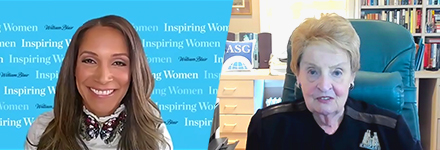
Dr. Madeleine Albright, the first woman to serve as U.S. secretary of state, shared her vast experiences and wisdom—from being an at-home mother of twins to becoming the most powerful woman in U.S. history—as the featured speaker at William Blair’s Inspiring Women event held March 4.
The forum, held virtually for the first time in 2021, is now in its 17th year. It attracts women investors, civic leaders, entrepreneurs, and philanthropists to gather and inspire change by discussing some of the world’s most important issues.
Like many women, Albright has held multiple roles simultaneously. Those have included professor, author, diplomat, mother, grandmother, and businesswoman. But unlike many women, she became the 64th U.S. Secretary of State—the first woman ever to serve in that role. She did it by building connections, working hard, and learning to navigate in a male-dominated political world.
“It’s very hard to plan everything,” Albright told the gathering. “You need to take advantage of opportunities offered—and work hard. There is plenty of room for mediocre men in the world but there is no room for mediocre women.”
A life of accidental events
She says in many ways her life has been a series of accidental events that led to more opportunities. Among those was meeting Senator Ed Muskie of Maine, who ran for president in 1972. At the time, she was living in Washington, D.C., doing fundraising for her children’s school. Her fundraising partner, also from Maine, asked if she could help with a fundraising dinner for Muskie.
It turned out to be the biggest fundraising dinner and the most expensive in history at the time, with the top seats at $125, said Albright, with a laugh. She became Muskie’s fundraiser and eventually his chief legislative assistant in 1976, an era when very few women worked in senatorial offices.
“That was the beginning of my serious governmental work,” said Albright, who was 39 at the time.
Another event Albright shared was a call she received in January 1977 from Zbigniew Brzezinski, her former professor at Columbia University where she earned her PhD. Brzezinski, who had just been appointed national security advisor by President Carter, called not to offer her a job, as she hoped, but needed help finding a place to live—which she did.
“But two years later he did offer me a job to do Congressional relations for the National Security Council,” she said.
While Albright felt prepared for Congressional relations, working in the White House was a new experience.
“I felt that I was always being looked at and having to prove my credibility,” Albright said. “At the same time—I was trying to manage how my three children would get along as I had very long hours.”
Then in 1993 Albright became the American ambassador to the United Nations and four years after that was appointed secretary of state by President Clinton—a position she held until 2001. President Obama awarded Albright the Presidential Medal of Freedom, the nation’s highest civilian honor, in 2012.
Learn to interrupt
Throughout her career Albright, like many women leaders she knows, found herself as the only woman in meetings. There were times when she held herself back, waiting for the right opportunity to share an idea. Then a man would say what she was thinking and everyone thought it was brilliant.
Women are much better off if there are other women in the room, she often says.
Part of what Albright experienced as the only woman in the room was not being called on often. She learned that women had to interrupt in meetings. So, after the Carter administration when Albright went on to teach at Georgetown, she instituted a policy in her classroom that nobody could raise his or her hand to speak; everyone had to interrupt.
“My classes were a bit of a zoo but often if a student raised their hand, by the time they were called on their comment was no longer germane to the discussion.”
She found herself in a similar situation when she was the ambassador to the United Nations. Albright was the only woman in a meeting of men and thought about not speaking that day, waiting to gauge the mood of the room. Then she saw the sign in front of her that said, “United States.”
“I said to myself, if I don’t speak today the voice of the United States will not be heard,” Albright recalled. “Even what I was teaching, I had to deliberatively prepare myself to do.”
An optimist
During the event, Albright also addressed questions related to today’s geopolitical world. Asked what she thought was the nation’s greatest global threat, she responded by saying China. Concerns range from China’s advances in technology to shipping restrictions in the South China Sea.
“But in some ways we are own global threat,” she added. “There are issues in the United States that have made it much harder to have the role I think we need to have in the world.”
However, Albright remains optimistic.
She believes it will take people working together to solve problems, understanding different viewpoints, and being respectful listeners. What makes it especially hard now is it requires people-to-people contact, she says, something we’ve been missing during the pandemic.
“One can Zoom a lot but it isn’t the same as sitting down with somebody, having coffee, and talking over things.”


